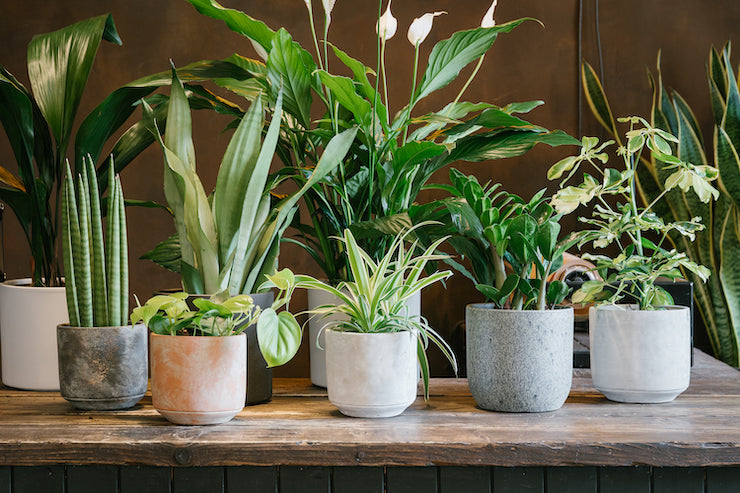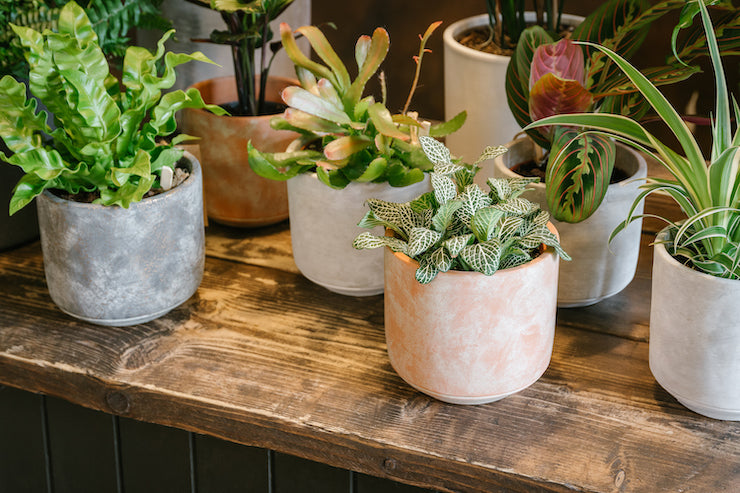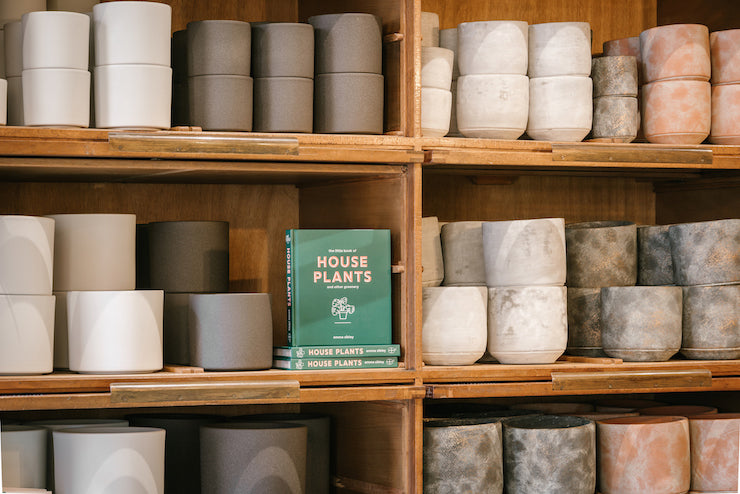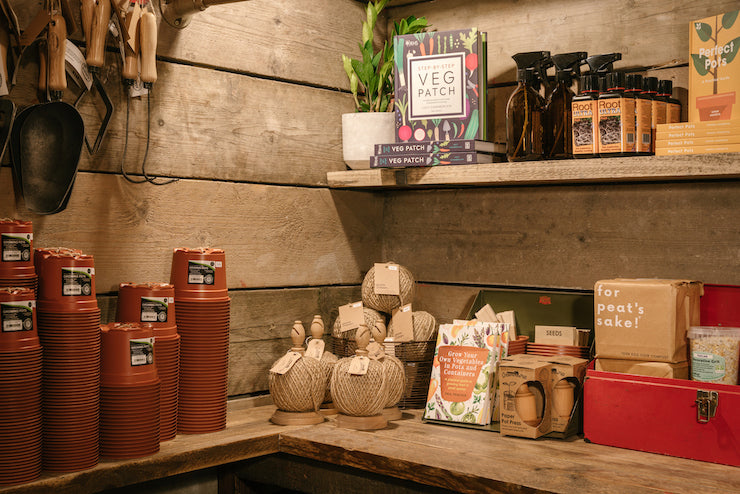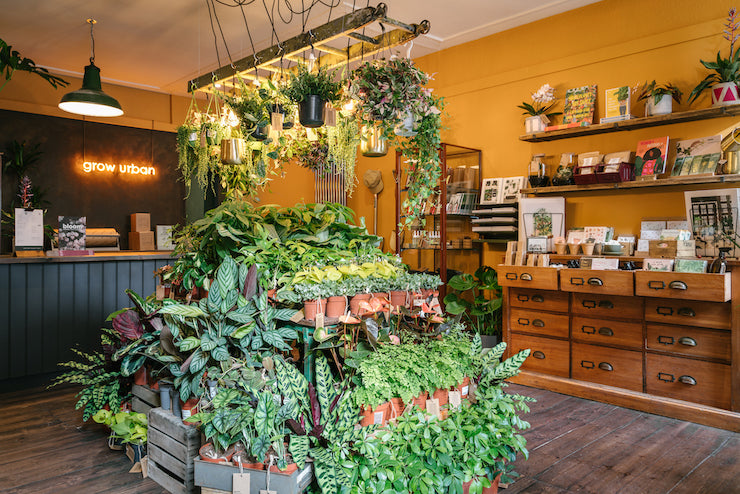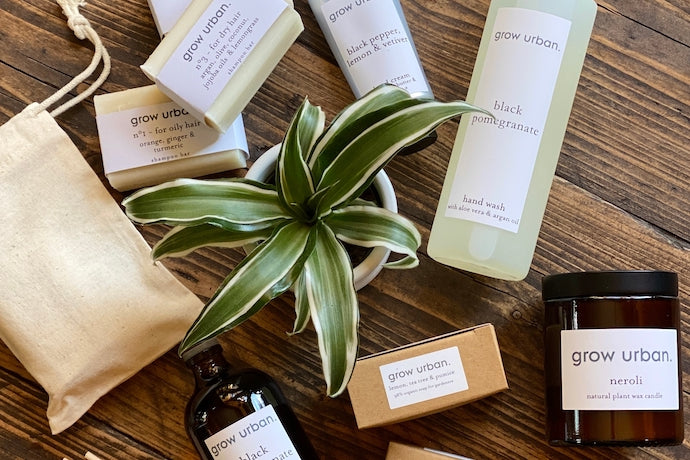
Compost Guide: what to use and how to mix your own
It looks like the weather has finally settled into something a little more spring-like and with more sunshine and warmth it’s time to start considering what this means for our leafy home decor. Spring and summer are considered the growing season as houseplants wake up from winter dormancy and begin to start pushing out lots of new growth. For this reason, it’s time to consider tweaking our plant care routines by feeding, repositioning and, most importantly repotting!
When repotting plants, it is important to consider your plants native environment. Do they grow in tropical rainforests and therefore require a soil with a balance of moisture retention and drainage? Maybe your houseplant comes from the desert and naturally lives in a media with lots of drainage and very little water retention. Some plants prefer for their roots to latch on to barky tree trunks and gain their moisture predominantly through humidity and rainfall rather than from being placed in compost at all. With this mind let’s look at all things compost so you can understand your plants compost requirements and why it is so important.
General Houseplant Compost
General houseplant compost can predominantly be used for most leafy plant varieties as it holds the correct levels of moisture retention and drainage for plants that generally grow in tropical, humid environments.
When using a more basic, budget friendly compost such as Houseplant Focus we recommend adding 20% perlite to 80% compost. Although this sterilised compost contains fine bark, coir and wood fibre it can become overly compact over time and by adding perlite you can increase drainage and air circulation around the root systems to keep them healthy and rot free!
Our go to general houseplant compost is the Soil Ninja Base Mix. This compost differs from more basic mixes as it already has a great base level of drainage and aeration due to the added perlite, coco coir and worm castings. This mix is a great option as it is, however, it can be further tailored to meet specific plants needs. For example, when repotting higher maintenance plants such as Alocasia we recommend adding 20% Bark and 20% Vermiculite to 60% of this blend.
Fresh compost replaces the nutrients lost in old potting compost so you will not need to resume feeding during the Growing Season until around 6 weeks after repotting. For a basic feed choose Houseplant Focus 300ml or Houseplant Myst. For a more versatile feed that can be used on a wider variety of plants our go to is Liquid Gold Leaf available in 250ml or 500ml.
Cacti and Succulent Compost
It is important when repotting cacti and succulents to choose a compost with lots of drainage as, in their native environments, these plant types gain their moisture from occasional heavy downpours before their soil quickly dries again. Avoid using general houseplant composts as these mixes will likely hold on to too much moisture and can easily result in root rot if incorrectly watered.
For a basic mix choose Cactus Focus. This is a good general option as on top of its usual mix of sterilised soil, coir and fine bark, this mix has added sand and grit for extra drainage.
For a more tailored cacti and succulent mix combine 40% Soil Ninja Base Mix with 30% Grit, 20% Sand and 10% Zeolite. This premium mix will allow most of the moisture to drain through easily during watering due to the added grit and sand. However, the cocoa coir in the Base Mix and added zeolite will allow for just enough water retention for the plant to quickly absorb. As well as cacti and succulents this compost is great for Ceropegia, Sago Palms, Zamioculcas zamiifolia and Poinsettia.
For a basic feed we recommend Cactus and Succulent Focus 300ml. For a more versatile feed that can be used on a wider variety of plants, our go to is Liquid Gold Leaf available in 250ml or 500ml.
Orchid Compost
Have you ever wondered why certain plants such as orchids are grown in bark instead of compost? This is because they can be found naturally growing on tree trunks in tropical rainforests and predominantly rely on rainfall and humidity for moisture rather than pulling water from dense soil. We recommend using Orchid Bark for repotting orchids and replacing all the bark when transferring to a larger pot. As their root systems are naturally exposed on tree trunks, make sure you use a clear plastic pot to allow their roots to photosynthesise as well as their leaves.
To create your own mix for epiphytic plants such as Orchids, Bromeliads and Rhipsalis, mix 30% Soil Ninja Base Mix with 50% Bark and 20% Zeolite. This light, loose mix creates large air chambers for the plant's larger root systems to crawl through and attach as if they are clinging to tree trunks. It also creates optimum levels of drainage and aeration for happy, healthy root growth.
For a basic feed choose from our variety of Focus Orchid Feeds including Orchid Bloom 300ml, Orchid Grow 300ml or Orchid Myst. For a more versatile feed that can be used on a wider variety of plants, our go to is Liquid Gold Leaf available in 250ml or 500ml.
Terrarium Compost
Terrariums have slightly differing requirements from if the same plants were grown in pots rather than sealed vessels. Terrariums recycle their own air and water and can become overly damp if the incorrect compost is used. This excess water can result in the plants rotting. Therefore, we recommend Soil Ninja’s Terrarium Blend, which is a blend of Activated Charcoal, Bark, Zeolite, Sand, Grit, Cocoa Coir and Worm Castings. This mix is suitable for open or closed terrariums as well as humidity loving plants such as Fittonias, Hypoestes, Macodes petola and African Violets. It is important to add a drainage layer of clay pebbles before adding compost to terrariums to prevent any plant roots sitting in excess water that may sit at the base of the vessel.
For more terrarium building info check out our ‘Terrariums’ blog;
https://growurban.uk/blogs/news/terrariums
Outdoor
For those lucky enough to have a garden in the city centre choose ‘RocketGro Multi-Purpose Outdoor Compost 20L’. Rocket Gro is produced using Digestate which is a rich alternative to chemical fertilisers. Digestate is a by-product produced by a BioGas plant which allows Rocket Gro to offer a renewable, bio active, environmentally friendly, eco compost alternative to what is generally available in garden centres. This is organic multi-purpose compost with added John Innes is the perfect option for garden beds, pots, containers, window boxes and hanging baskets.
Check out our Organic Garden Fertliser 1L for all your outdoor feeding needs!
Remember!! Never use multi-purpose compost when repotting houseplants as these are designed to hold a huge amount of moisture which is more likely to cause your houseplants to rot.
Looking for more information on creating blends for specific plant varieties? Speak to our Plant Gurus in store for advice!


